
The BBC Radiophonic Workshop was one of the sound effects units of the BBC, created in 1958 to produce incidental sounds and new music for radio and, later, television. The unit is known for its experimental and pioneering work in electronic music and music technology, as well as its popular scores for programmes such as Doctor Who and Quatermass and the Pit during the 1950s and 1960s.
Mindwarp is the second serial of the larger narrative known as The Trial of a Time Lord which encompasses the whole of the 23rd season of the British science fiction television series Doctor Who. It was first broadcast in four weekly parts on BBC1 from 4 to 25 October 1986. The title Mindwarp is not used on screen and appears only on the serial's scripts with the four episodes that comprise the story being transmitted as The Trial of a Time Lord Parts Five to Eight. This story marks the final appearance of Nicola Bryant as Peri Brown.

The Hitchhiker's Guide to the Galaxy is a science fiction comedy radio series primarily written by Douglas Adams. It was originally broadcast in the United Kingdom by BBC Radio 4 in 1978, and afterwards the BBC World Service, National Public Radio in the US and CBC Radio in Canada. The series was the first radio comedy programme to be produced in stereo, and was innovative in its use of music and sound effects, winning a number of awards.

The Hitchhiker's Guide to the Galaxy is a BBC television adaptation of Douglas Adams' The Hitchhiker's Guide to the Galaxy which aired between 5 January and 9 February 1981 on BBC2 in the United Kingdom. The adaptation follows the original radio series in 1978 and 1980, the first novel and double LP, in 1979, and the stage shows, in 1979 and 1980, making it the fifth iteration of the guide.
Paddy Kingsland is a composer of electronic music best known for his incidental music for science fiction series on BBC radio and television whilst working at the BBC Radiophonic Workshop. Educated at Eggar's Grammar School in Alton, Hampshire, he joined the BBC as a tape editor before moving on to become a studio manager for BBC Radio 1. In 1970 he joined the Radiophonic Workshop where he remained until 1981. His initial work was mostly signature tunes for BBC radio and TV programmes before going on to record incidental music for programmes including The Changes, two versions of The Hitchhiker's Guide to the Galaxy, as well as several serials of Doctor Who. His work on the latter series included incidental music for several serials in the early 1980s.
Peter Howell is a musician and composer. He is best known for his work on Doctor Who as a member of the BBC Radiophonic Workshop.

The Changes is a British children's science fiction television serial filmed in 1974 and first broadcast in 1975 by the BBC. It was directed by John Prowse and is based on the trilogy written by Peter Dickinson: The Weathermonger (1968), Heartsease (1969), and The Devil's Children (1970).
Roger James Limb is a British composer, specialising in electronic music. He was born in 1941 in Hitchin, Hertfordshire, England, UK. He is best known for his work on the television series Doctor Who whilst at the BBC Radiophonic Workshop. He joined the BBC as a studio manager, before going on to become a television announcer. In 1972 he left this position to join the Radiophonic Workshop, where he remained until 1995. Although he had received formal music training, he also spent much time in pop and jazz bands, the influence of which can be heard in much of his music.
Elizabeth Parker is a British film and television composer who worked at the BBC Radiophonic Workshop from 1978 until the workshop's closure.
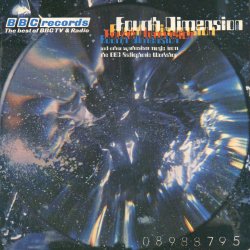
Fourth Dimension is a 1973 BBC Records release featuring recordings created by the BBC Radiophonic Workshop composer Paddy Kingsland. Although it was credited to "The BBC Radiophonic Workshop" it was the work of Kingsland alone, and was the first album of Workshop music to feature only one artist. It features theme tunes used by BBC radio and television. The music prominently features VCS 3 and "Delaware" Synthi 100 synthesisers, both from Electronic Music Studios (London) Ltd, with a standard rock-based session band providing backing. The track "Reg" featured as the B-side to the 1973 single release of the Doctor Who theme.

The Radiophonic Workshop is a 1975 compilation album by the BBC Radiophonic Workshop, similar in concept to the earlier BBC Radiophonic Music of 1968. The album featured a variety of work demonstrating many of the various techniques the Workshop used. Unlike its predecessor though, it was far more synthesiser orientated. The music comes from all types of sources from serious drama and documentary to the "Major Bloodnok's Stomach" sound effect from The Goon Show. As with the 1968 compilation, the album was remastered in 2002 by Mark Ayres and re-released with two bonus tracks from John Baker.
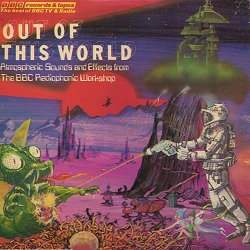
Out of This World is a 1976 British commercial LP release of atmospheric sounds and effects from the library of the BBC Radiophonic Workshop. The album was divided into four sections, each representing a different theme: "Outer Space", "Magic and Fantasy", "Suspense and the Supernatural" and "The Elements".
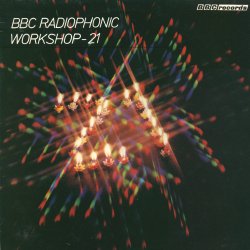
BBC Radiophonic Workshop – 21 is a compilation by the BBC Radiophonic Workshop to celebrate their 21st anniversary in 1979. It was compiled as an overview of their work both old and new, showcasing the changes in the Workshop as they developed from backroom sound effects suppliers for BBC Radio to full-fledged in-house music composers for the whole of the corporation. It demonstrates the move from the musique concrète and tape-manipulation techniques used in the early days, to the synthesiser works of the 1970s. The first side of the album consisted of material from 1958 to 1971, covering their early work creating jingles, sound-effects and some incidental music. This side includes the first material by Workshop founder Desmond Briscoe to be commercially released, as well as sound effects from The Goon Show, Maddalena Fagandini's interval signal that later became "Time Beat", some of Delia Derbyshire's experimental work and the pilot episode version of the Doctor Who theme music. The second side of the record covered the period between 1971 and 1979, including Richard Yeoman-Clark material from popular BBC series Blake's 7 and Peter Howell's vocoder heavy "Greenwich Chorus" theme for The Body in Question. It was reissued on CD by Silva Screen Records on 22 April 2016.
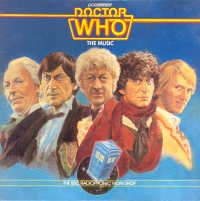
Doctor Who: The Music is a 1983 compilation of music from the BBC Radiophonic Workshop featuring incidental music from the popular science-fiction television series Doctor Who. The album was the first full-length to feature solely music from the programme. The collection was produced by Workshop member and long-time Doctor Who sound-effects creator Dick Mills. It featured the original Delia Derbyshire arrangement of Ron Grainer's theme tune and music by Malcolm Clarke from the 1972 serial "The Sea Devils", which was only the second to have an incidental score provided completely by the Radiophonic Workshop. Most of the music included came from serials from the previous three years to demonstrate the recent composers' works. For the album, each serial's incidental music was reassembled into short "suites" and although most of the music had been recorded in mono it was, for this compilation, remixed into stereo with sound effects added on to some tracks. The album was re-released in 1992 by Silva Screen records as Earthshock - Classic Music From The BBC Radiophonic Workshop Volume 1, with bonus tracks including "The Worlds of Doctor Who", a track recorded by Mills as a B-side to Dudley Simpson's 1973 "Moonbase 3" single, which featured a mix of music with sound effects from Planet of the Daleks before following with Simpson's "Master's Theme" and finishing with music from the serial The Mind of Evil. Selections from both this compilation and its follow-up, Doctor Who: The Music II, were also re-used on the 1994 Silva Screen compilation The Best of Doctor Who Volume 1: The Five Doctors.

Doctor Who at the BBC Radiophonic Workshop Volume 2: New Beginnings 1970–1980 is the second in a series of compilations of BBC Radiophonic Workshop music from Doctor Who. The album collected various incidental music from the 1970s including, for the first time, the complete Malcolm Clarke score for the 1972 serial The Sea Devils, only the second scored completely by the Radiophonic Workshop. The compilation also featured a few of Dudley Simpson's compositions as realised by Brian Hodgson, some Delia Derbyshire music as featured in Inferno, two Peter Howell demos from 1979 and a selection of Dick Mills' sound effects from the era.

Doctor Who at the BBC Radiophonic Workshop Volume 3: The Leisure Hive is the third in a series of compilations showcasing the BBC Radiophonic Workshop's work on the science-fiction programme Doctor Who. The album focused mainly on the Peter Howell synthesiser score for the 1980 serial The Leisure Hive, which received its first full release here. The compilation also collected some Dick Mills sound effects from the story as well as some effects from other 1980 serials Meglos and Full Circle, whose music would be the subject of the fourth volume in the series. The final track was a new remix of the original Delia Derbyshire version of the show's theme tune by series compiler Mark Ayres.

Doctor Who at the BBC Radiophonic Workshop Volume 4: Meglos & Full Circle is the final instalment in the Mark Ayres compiled series of releases of BBC Radiophonic Workshop music. It featured music, by Peter Howell and Paddy Kingsland, for the 1980 Doctor Who serials Meglos and Full Circle. It was the first full releases of both scores, although some sound effects from the serials appeared on the previous volume.

Music from the BBC Radiophonic Workshop is a 2003 limited edition 4X10" vinyl compilation collecting and re-ordering the compilations BBC Radiophonic Music and The Radiophonic Workshop, including the bonus tracks from their 2002 CD re-releases. It featured the remasters provided by Mark Ayres for the original re-releases. The tracks were ordered in such a way as to provide Delia Derbyshire and John Baker with the first records dedicated solely to their work. The album was released on electronic musician Richard D. James' Rephlex Records label.
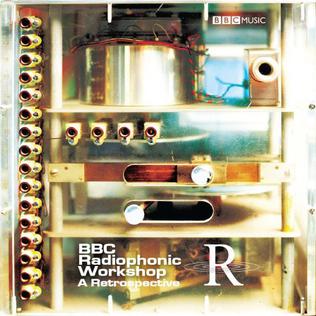
BBC Radiophonic Workshop – A Retrospective is a 2008 compilation of music and effects from the BBC Radiophonic Workshop. It was released to commemorate the 50th anniversary of the establishment of the workshop and includes material ranging from then to its closure. Many of the tracks were previously released on the BBC Radiophonic Workshop - 21 and The Soundhouse.
This is the discography of the BBC Radiophonic Workshop, a British electronic music group. It consists of releases of music and sound effects.














